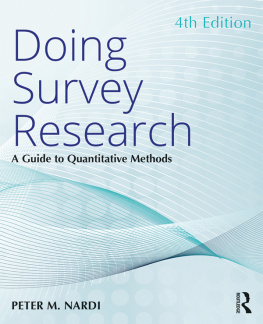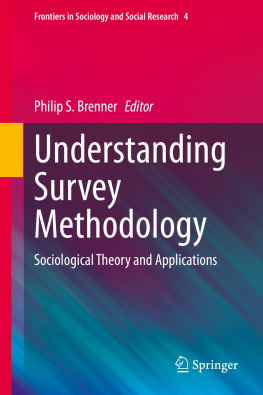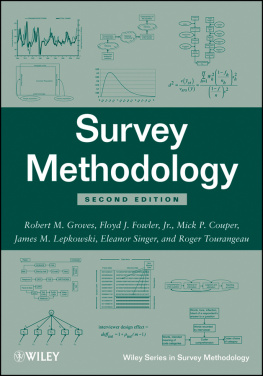Survey Research
 ESSENTIAL RESOURCES FOR SOCIAL RESEARCH
ESSENTIAL RESOURCES FOR SOCIAL RESEARCH
Series Editor: Keith F Punch, University of Western Australia
A series of short practical how-to books aimed at the beginning researcher. The books will cover a central topic, including the main methods, approaches and analytic techniques in social research, from developing a research topic through to writing and presenting research results. Each book is designed to be used as an independent guide or as a workbook to accompany Keith Punchs bestselling textbook An introduction to Social Research: Quantitative & Qualitative Approaches (Sage, 1998).
Survey Research
The Basics
Keith F Punch

Keith F Punch 2003
First published 2003
Apart from any fair dealing for the purposes of research or private study, or criticism or review, as permitted under the Copyright, Designs and Patents Act, 1988, this publication may be reproduced, stored or transmitted in any form, or by any means, only with the prior permission in writing of the publishers, or in the case of reprographic reproduction, in accordance with the terms of licences issued by the Copyright Licensing Agency. Enquiries concerning reproduction outside those terms should be sent to the publishers.

| SAGE Publications Ltd
6 Bonhill Street
London EC2A 4PU |
SAGE Publications Inc
2455 Teller Road
Thousand Oaks, California 91320 |
SAGE Publications India Pvt Ltd
B-42, Panchsheel Enclave
Post Box 4109
New Delhi - 100 017 |
British Library Cataloguing in Publication data
A catalogue record for this book is available from the British Library
ISBN 0 7619 4704 3
ISBN 0 7619 4705 1 (pbk)
Library of Congress Control Number: 2002114574
Typeset by Mayhew Typesetting, Rhayader, Powys
Printed and bound in Great Britain by TJ International, Padstow, Cornwall
Contents
List of Tables
List of Boxes
Preface
Introduction to Social Research (Punch, 1998: 76-83) dealt in general terms with the topic of the correlational survey, or the quantitative-survey-relating-variables. This book develops the topic in greater detail, aiming both to show the logic of the survey and to offer hands-on advice to student researchers preparing such surveys as projects or dissertations. It is the second book in the series Essential Resources for Social Research. The first was Developing Effective Research Proposals (Punch, 2000).
The focus here is on the quantitative-survey-relating-variables, the essential idea of which is that a sample of people will be measured across a number of variables, using a self-report questionnaire, and the resulting quantitative data will be used to study relationships between the variables. Of course this is only one type of survey. But I believe it to be the most common type, especially among student projects. Whether that is true or not, the knowledge gained from a detailed understanding of this type of survey transfers to other types of survey.
The book therefore aims to build a thorough understanding of the logic of this type of survey, and to offer hands-on advice as to how to conduct one. It unpacks the survey to show what the elements and the issues are on a logical basis. In line with this, therefore, the survey method is not theorised to any great extent, and technical issues are not overly stressed. Of course, numerous technical issues underlie the logic. Because I have wanted to keep these as far as possible out of the text, I have suggested further reading on key technical issues in .
Once again, I want to thank the research students and researchers I have worked with over the years. I also want to thank John West, Barry Sheridan and Russell Waugh, colleagues who have helped in different ways with the content of this book, and Myra Taylor who helped with the index. Robyn Wilson has again been of great assistance in the preparation of the manuscript, and Zoe Elliott, Michael Carmichael and the team at Sage Publications (UK) have as usual been most supportive and a pleasure to work with.
Once again, too, I would welcome feedback on this book.
1
Introduction and Purpose
CONTENTS
1.1 FOCUS AND PURPOSE OF THIS BOOK
The survey has long been a central strategy in social research. However, the term survey itself is very broad, covering many different types, and it is used in many different ways and in many different contexts. Because of this, there already exists a great deal of literature on survey methods, some of it general and some of it focused on surveys in particular types of situation. A new book on surveys therefore needs to have a distinct focus based on a clear rationale.
This book focuses on small-scale quantitative surveys which study the relationships between variables. The reason for the focus on quantitative-surveys-relating-variables is that this method is central to a very wide range of social science research, but is not often dealt with directly, and as a whole, in the literature. The reason for the focus on small-scale surveys is that the book is aimed at graduate students in a research training environment where very often only small-scale surveys are possible.
Of course, not all surveys are quantitative. Qualitative surveys, usually asking open-ended questions, do not normally produce quantitative or numerical data. People respond with answers to these open-ended questions in words, and researchers often proceed to analyse such responses without somehow transforming the words into numbers. Such surveys are not included in this book, which deals only with surveys designed around quantitative data.
The essence of quantitative research is the study of relationships between variables. For the quantitative researcher, reality is conceptualised as variables which are measured, and the primary objectives are to find how the variables are distributed, and especially how they are related to each other, and why. As is described in , a feature of the methodological history of quantitative social science has been the move away from the experimental method, where the researcher manipulates one or more variables in order to study their effects on other variables, to a broader non-experimental method and design, where the researcher uses naturally occurring variation in variables to study relationships between them. In other words, the strategy for studying the relationship between variables has broadened from a narrow concentration on experimental method to a more widely applicable approach using non-experimental methods.
The basic reason for this move has been the limited scope of the research questions which can be answered using the true experimental method, especially as social science areas expanded beyond psychology and education. For the great majority of research areas and topics, in a large number of social science areas, the researcher cannot manipulate variables for research purposes in order to study their effects. Research methodologists therefore developed non-experimental methods, by applying the logic of the experiment to the non-experimental research situation. This means that non-experimental quantitative methods are now an essential part of the methodological expertise of the social science researcher. It becomes correspondingly important for student researchers to learn these methods. The phrase non-experimental quantitative methods really means quantitative survey methods which focus on the relationships between variables.
Next page





 ESSENTIAL RESOURCES FOR SOCIAL RESEARCH
ESSENTIAL RESOURCES FOR SOCIAL RESEARCH
